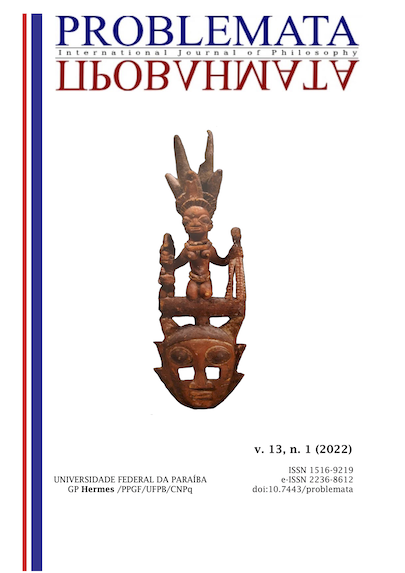HEGEL 'TRANSLATOR' NOT ONLY TRANSLATED:
INTELLECT AND SOUL BETWEEN TRANSLATOLOGY, HERMENEUTICS, AND THEORIZING
DOI:
https://doi.org/10.7443/problemata.v13i1.61079Keywords:
Hegel, Aristotele, Anima, Intelletto, PensieroAbstract
The case of the translation of the Aristotelian De anima III 4-5 (429b22-430a25) in the overall panorama of translation science is more unique than rare. Hegel, in a particular moment of his theoretical activity (around 1816-1820), finds some really significant hints in the distinction between νοῦς παθητικός or in potentiality and νοῦς ποιητικός or in the act, which Aristotle describes in his quoted text which is equally more unique than rare and valued one of the most complexes of philosophical literature. Although Hegel remodels the distinction according to the personal dialectic of oppositions, in this case of passivity and the activity of thinking with its logical (conceptual thinking), psychological (the dimension of Versand), and anthropological (the dimension of Seele) implications, it shows a truly precious and very high translational diligence and competence, even if the said translation is carried out above all ad usum privatum with natural didactic purposes especially in the field of history of philosophy.
Downloads
References
BERTI, Enrico. Aristotle’s Nous poiêtikos: Another Modest Proposal, Il noûs di Aristotele, G. Sillitti, F. Stella e F. Fronterotta (eds.), Sankt Augustin, Akademia Verlag, 2016, p. 137-154.
BRUNI, Leonardo. Sulla perfetta traduzione, Liguori, Napoli 2004.
CORTI, Luca. Pensare l'esperienza. Una lettura dell'Antropologia di Hegel, Bologna, Pendagron, 2016.
DOLET, Etienne. La manière de bien traduire d’une langue en autre (Lyon 1540), Slatkine Reprints, Genève 1972.
FEOLA, G. Ordine, intelligenza e intelligibilità del cosmo nel De anima di Aristotele (III, 4-5), Methodos (on line), 16, 2016. http://journals.openedition.org/methodos.
FERRARIN, A. Hegel and Aristotle, Cambridge, University Press, 2001
FRONTEROTTA, Francesco. Il significato del verbo νοεῖν in De anima III 4, in Il noûs di Aristotele, G. Sillitti, F. Stella e F. Fronterotta (eds.), Sankt Augustin, Akademia Verlag, 2016, pp. 77-96.
FRONTEROTTA, Francesco. Οὐ μνημονεύομεν δέ... Aristot. De anima G 5. 430 a 23-5, Elenchos 2007, pp. 79-105.
GARDES-TAMINE, Joëlle. La stylistique, Colin, Paris, 2010 (1992, 2005).
GOETHE, Johann Wolfgang. Divan occidentale–orientale, a cura di G. Cusatelli, Einaudi, Torino 1990, pp. 364-366.
GOETHE, Johann Wolfgang. Noten und Abhandlungen zum west–östlichen Diwan, Sämtliche Werke, Jubiläumsausgabe, Stuttgart–Berlin 1905.
JAKOBSON, Roman. Saggi di linguistica generale, Feltrinelli, Milano, 2002, pp. 56-64 (tr. it. di Essais de linguistique générale, Minuit, Paris 1963, raccolta di saggi a loro volta tradotti dall’inglese da Nicholas Ruwet).
LANDOLFI-PETRONE, Giuseppe. La presenza di Aristotele nell’Audiktionskatalog della biblioteca di Hegel, Bibliothecae Selectae da Cusano a Leopardi, Firenze, Olschki, 1993, pp. 623-631.
HEGEL, Georg Wilhelm Friedrich. Jenaer Systementwürfe II. Gesammelte Werke 7, Hamburg, Meiner, 1971.
HEGEL, Georg Wilhelm Friedrich. Briefe von und and Hegel, IV1, Hamburg, Meiner, 1977.
HEGEL, Georg Wilhelm Friedrich. Wissenschaft der Logik. Erster Band. Die objektive Logik (1812/13), Gesammelte Werke 10, Hamburg, Meiner, 1978.
HEGEL, Georg Wilhelm Friedrich. Wissenschaft der Logik. Zweiter Band. Die subjektive Logik (1816), Gesammelte Werke 12, Hamburg, Meiner, 1981.
HEGEL, Georg Wilhelm Friedrich. Enzyklopädie der philosophischen Wissenschaften im Grundrisse (1827), Gesammelte Werke 19, Hamburg, Meiner, 1989.
HEGEL, Georg Wilhelm Friedrich. Enzyklopädie der philosophischen Wissenschaften im Grundrisse (1830), Gesammelte Werke 20, Hamburg, Meiner, 1992.
HEGEL, Georg Wilhelm Friedrich. Enzyklopädie der philosophischen Wissenschaften im Grundrisse (1817), Gesammelte Werke 13, Hamburg, Meiner, 2001.
HEGEL, Georg Wilhelm Friedrich. Aristoteles De Anima III. Gymnasialkurse und Gymnasialreden (1808-1816), Gesammelte Werke 101-2, Hamburg, Meiner, 2006, pp. 517-521.
HEGEL, Georg Wilhelm Friedrich. Vorlesungen über die Philosophie des Subjektiven Geistes I, Gesammelte Werke 25.1, Hamburg, Meiner, 2008.
HEGEL, Georg Wilhelm Friedrich. Vorlesungen über die Philosophie des Subjektiven Geistes II, Gesammelte Werke 25.2, Hamburg, Meiner, 2012.
HEGEL, Georg Wilhelm Friedrich. Vorlesungen über die Geschichte der Philosophie I, Gesammelte Werke 30.1, Hamburg, Meiner, 2016.
HEGEL, Georg Wilhelm Friedrich. Vorlesungen über die Geschichte der Philosophie II, Gesammelte Werke 30.2, Hamburg, Meiner, 2020.
NERGAARD, Siri (ed.). La teoria della traduzione nella storia, Bompiani, Milano, 1993.
VON HUMBOLDT, Wilhelm. “Einleitung zur Agamemnon–Übersetzung”, in «Ripae ulteriori amores». Traduzione e Traduttori, a cura di G. Franchi e A. Marchetti, Marietti 1991, pp. 17-32.
VON HUMBOLDT, Wilhelm. Einleitung zum ‘Agamemnon’, Werke in fünf Bänden, Bd. V Kleine Schriften. Autobiographisches, Dichtungen, Briefe, Kommentare und Anmerkungen zu Band I–V, Wissenschaftliche Buchgesellschaft, Darmstadt 1981, pp. 137-145.
WEISSE, Christian Hermann. Aristoteles von der Seele und von der Welt, Leipzig, Barth, 1829.
Downloads
Published
Issue
Section
License
Copyright (c) 2022 Vittorio Ricci

This work is licensed under a Creative Commons Attribution 4.0 International License.
Authors who publish with this journal agree to the following terms:
- Authors retain copyright and grant the journal right of first publication with the work simultaneously licensed under a Creative Commons Attribution License that allows others to share the work with an acknowledgement of the work's authorship and initial publication in this journal.
- Authors are able to enter into separate, additional contractual arrangements for the non-exclusive distribution of the journal's published version of the work (e.g., post it to an institutional repository or publish it in a book), with an acknowledgement of its initial publication in this journal.
-
- Authors are permitted and encouraged to post their work online (e.g., in institutional repositories or on their website) prior to and during the submission process, as it can lead to productive exchanges, as well as earlier and greater citation of published work (See The Effect of Open Access).





